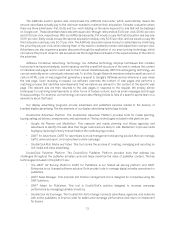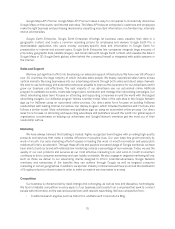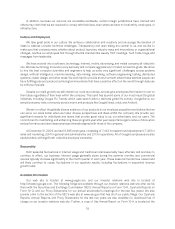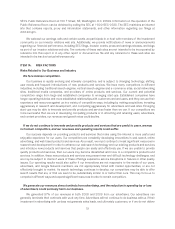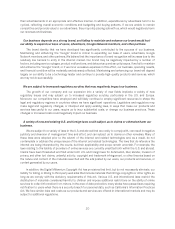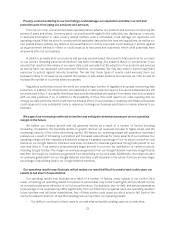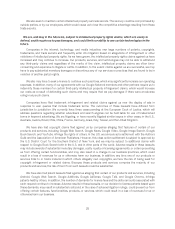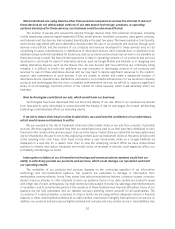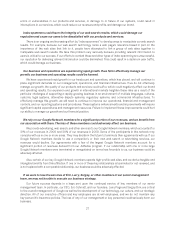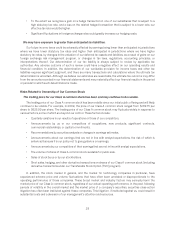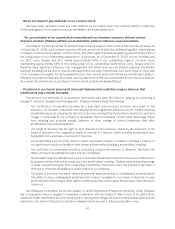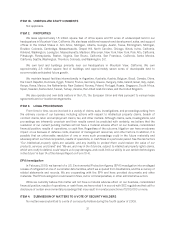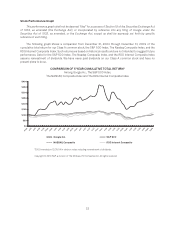Google 2009 Annual Report Download - page 41
Download and view the complete annual report
Please find page 41 of the 2009 Google annual report below. You can navigate through the pages in the report by either clicking on the pages listed below, or by using the keyword search tool below to find specific information within the annual report.Privacy concerns relating to our technology could damage our reputation and deter current and
potential users from using our products and services.
From time to time, concerns have been expressed about whether our products and services compromise the
privacy of users and others. Concerns about our practices with regard to the collection, use, disclosure, or security
of personal information or other privacy related matters, even if unfounded, could damage our reputation and
operating results. While we strive to comply with all applicable data protection laws and regulations, as well as our
own posted privacy policies, any failure or perceived failure to comply may result in proceedings or actions against
us by government entities or others, or could cause us to lose users and customers, which could potentially have
an adverse effect on our business.
In addition, as nearly all of our products and services are web based, the amount of data we store for our users
on our servers (including personal information) has been increasing. Any systems failure or compromise of our
security that results in the release of our users’ data could seriously limit the adoption of our products and services
as well as harm our reputation and brand and, therefore, our business. We may also need to expend significant
resources to protect against security breaches. The risk that these types of events could seriously harm our
business is likely to increase as we expand the number of web based products and services we offer as well as
increase the number of countries where we operate.
Regulatory authorities around the world are considering a number of legislative proposals concerning data
protection. In addition, the interpretation and application of data protection laws in Europe and elsewhere are still
uncertain and in flux. It is possible that these laws may be interpreted and applied in a manner that is inconsistent
with our data practices. If so, in addition to the possibility of fines, this could result in an order requiring that we
change our data practices, which could have an adverse effect on our business. Complying with these various laws
could cause us to incur substantial costs or require us to change our business practices in a manner adverse to our
business.
We expect our revenue growth rate to decline and anticipate downward pressure on our operating
margin in the future.
We believe our revenue growth rate will generally decline as a result of a number of factors including
increasing competition, the inevitable decline in growth rates as our revenues increase to higher levels, and the
increasing maturity of the online advertising market. We believe our operating margin will experience downward
pressure as a result of increasing competition and increased expenditures for many aspects of our business. Our
operating margin will also experience downward pressure if a greater percentage of our revenues comes from ads
placed on our Google Network members’ web sites compared to revenues generated through ads placed on our
own web sites or if we spend a proportionately larger amount to promote the distribution of certain products,
including Google Toolbar. The margin on revenues we generate from our Google Network members is significantly
less than the margin on revenues we generate from advertising on our web sites. Additionally, the margin we earn
on revenues generated from our Google Network members could decrease in the future if we pay an even larger
percentage of advertising fees to our Google Network members.
Our operating results may fluctuate, which makes our results difficult to predict and could cause our
results to fall short of expectations.
Our operating results may fluctuate as a result of a number of factors, many outside of our control. As a
result, comparing our operating results on a period-to-period basis may not be meaningful, and you should not rely
on our past results as an indication of our future performance. Our quarterly, year-to-date, and annual expenses as
a percentage of our revenues may differ significantly from our historical or projected rates. Our operating results in
future quarters may fall below expectations. Any of these events could cause our stock price to fall. Each of the
risk factors listed in this Item 1A and the following factors may affect our operating results:
• Our ability to continue to attract users to our web sites and satisfy existing users on our web sites.
23


